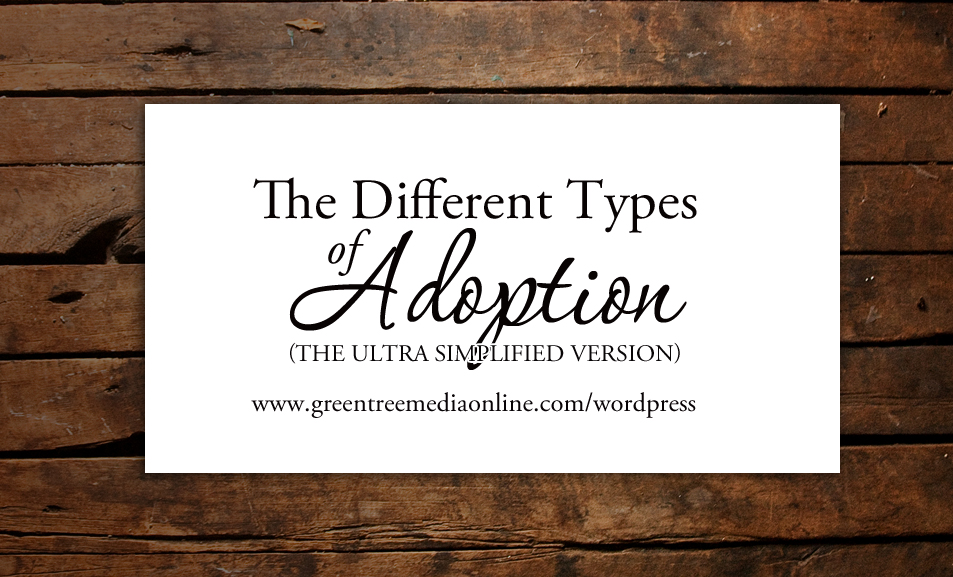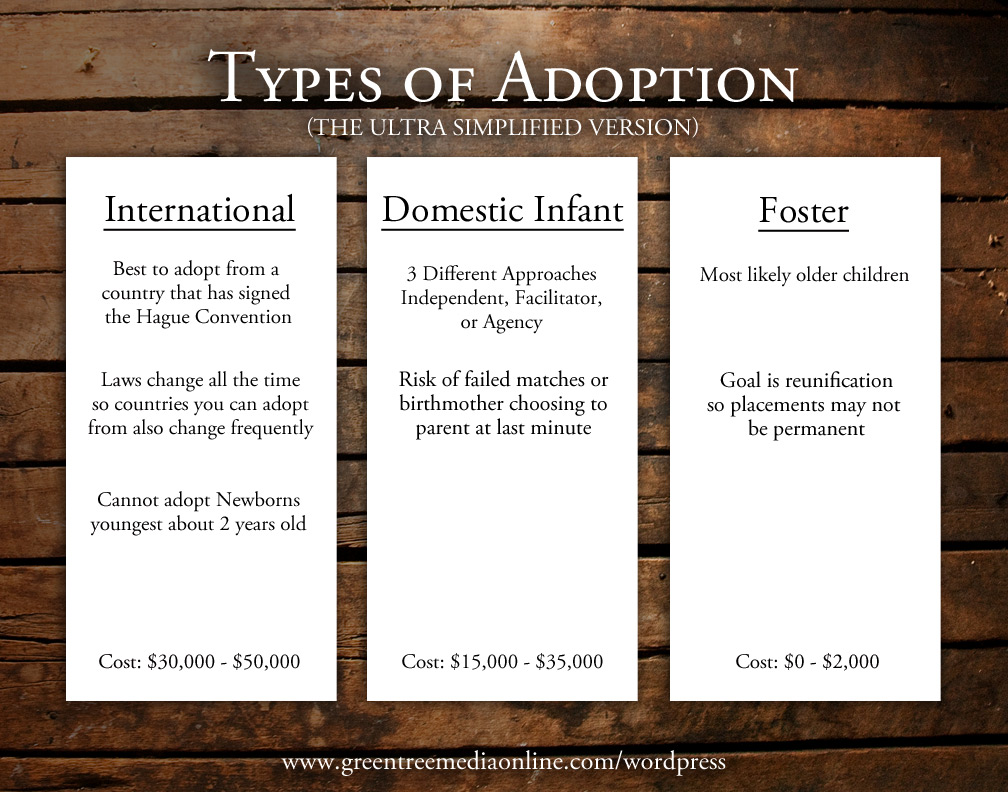The Different Types of Adoption

I’ve been involved in a lot of adoption-related conversations lately. With other adoptive parents, with hopeful parents, and with those who just don’t know. It got me thinking and looking through old posts and I realized – I don’t think I’ve ever really explained the different types of adoption here. I know I’ve written a couple times in the past to try to explain that adoption is anything but simple and not necessarily the answer to a couple’s infertility. (There was a time it wasn’t the answer for us either.) But if you’re someone who is considering adopting or just wanting to understand it a little better – here is a (super) simplified break down of the different options.
There are really three important questions to ask yourself when considering adoption
- Do I want to adopt from the United States or internationally?
- Do I want a newborn or would an older child be okay?
- What can I afford?
The first question is pretty straight forward – adopt internationally or domestically. One certainly isn’t better than another or easier than another. They each come with their own unique sets of challenges, concerns, and considerations. We can get down into all of the complexities of that as we progress. So let’s move on to question two!
Are you wanting to adopt a newborn? If the answer to that question is yes – you have one route and if your answer is no – another. If you’re hoping to adopt a newborn you can do so independently or with the assistance of an agency or facilitator. In a very small number of instances you can sometimes foster to adopt newborns, but that is certainly not as common. Which leads us into adopting children who are not newborns. Obviously fostering to adopt is an option here and you’ll see a range of ages here too. Your other option for non-newborns would be international adoption where children are generally around 2 years old before they are able to be adopted and brought home.
So now the big one – what can you afford? You may be surprised by that question but adoption can be quite costly (in more ways than just financially though that’s what I’m focusing on right now). With any adoption you will have the initial fees for processing everything like getting your background checked, homestudy fees, readying your home, in some instances getting licensed, and then the eventual legal fees. If your budget is smaller, you’ll find that adopting through foster care can be the least expensive option since many of the adoption fees will end up being covered by the state. On average, adopting through foster care can cost anywhere between nothing and $2,000 depending on the individual situation. International adoption is typically the most expensive because in addition to our country’s costs and requirements, you have the country you’re adopting from’s requirements as well. This can get complicated because different countries have different requirements and some may even require you to spend a set amount of time in their country before you can bring your child home. With international adoption, you could be spending anywhere between $30,000 and $50,000 depending on the country you’re adopting from and the specific situation. Domestic adoption, of course, falls right in the middle and depending on the way you approach adopting this way – it can vary in cost too. Adopting independently is typically the least expensive since through this route you are doing all the work to make connections and find a birthmother. Facilitators and agencies are a coin toss in my opinion… Often facilitators claim to be less expensive because you’re doing most of the connecting and they simply act as a marketing team to broaden your reach. Whereas an agency, while it may cost more on paper, takes care of all aspects of the adoption and connecting you with the right people. Domestic adoption typically costs somewhere between $15,000 and $35,000. (Please bear in mind this is ULTRA simplified because this could be a post all on it’s own!)
So that addressed all those question I had at the beginning but I can’t talk about this without at least mentioning some of the concerns or complications you may face when adopting. This too could be an entire blog post all on it’s own so I’m going to touch on just the major concerns with each type. (Otherwise we’d be here all day haha) So with adopting through foster care there’s two things to consider. First, the goal of foster care is to reunite families. So you’ll need to be prepared for the very real possibility that the child or children placed in your care, may not get to be a permanent part of your family. The other thing to be aware of is that many children adopted through foster care may have additional needs. Some may be very small but some may be larger due to trauma or other things they may have experienced before being placed into your care. This can also be a concern for children adopted internationally since they are older too. With international adoption, one of the biggest concerns is changing laws and regulations. Over the years, countries that have been open for adoption with the United States have changed their status. And it can change mid-process. We’ve known people who’ve traveled overseas and met their child and had the law change before finalization, which meant they were stuck in a foreign country fighting for their right to bring their child home. This can be not only emotionally draining, but financially as well as with the additional legal expenses that pop up when this occurs. Also with international adoption, you should keep in mind your child’s cultural heritage and find ways to infuse their culture into daily life. This is also true for those adopting a child domestically who has a different ethnic background. You’ll most likely take classes about this during your homestudy process, but it is something to keep in mind as you move forward. Lastly, with domestic adoption you need to be prepared for failed matches and the possibility of a birth mother changing her mind within the first three days after the baby is born. Most states give a mother 72 hours before she can terminate her rights and that gives her the opportunity to think through her decision and be certain of placement.

It’s important too to think about the complex emotions your child (and his/her birthmother/family) may experience. You may be overjoyed at becoming parents, but there is still a world of loss attached to adoption and you need to consider how your child (and their bio family) might feel and how that might shift as time passes and how you will help them with that. I think to be really good parents we need to think about all of these aspects and all of the people involved and the different hurts that may arise.
And this… guys – this is just the tip of the iceberg on all of this… Yes adoption is beautiful, but incredibly complex… it’s complex in a way that all the people I ever had ask us “why don’t you just adopt?” don’t understand. It’s expensive. It’s confusing. It’ll break your heart in a million ways. And that’s okay. But I think it can be hard for those adopting or considering adopting to even know where to start in the beginning of their journey. And it can be hard trying to explain all of this to people on the outside. It’s not simple and there is going to be a different right answer for everyone.
So I’m curious… is this interesting to you guys? Would you like to see more posts about this stuff? Because truthfully there is so much information it would be impossible to put it all in one post. Let me know and leave a comment below!
 Previous post
Grad School Update…
Previous post
Grad School Update…
 Next post
2018 Trip to Okaw Valley Apple Orchard
Next post
2018 Trip to Okaw Valley Apple Orchard
